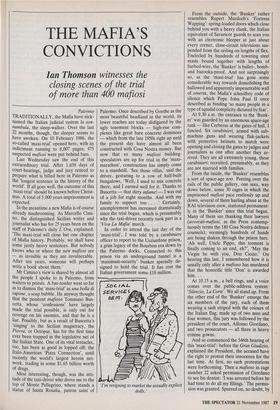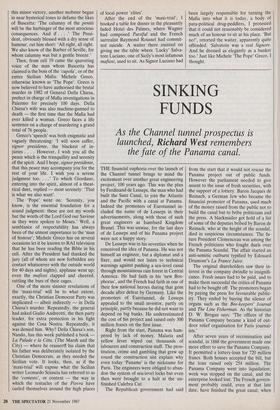THE MAFIA'S CONVICTIONS
Ian Thomson witnesses the
closing scenes of the trial of more than 400 mafiosi
Palermo TRADITIONALLY, the Mafia have nick- named the Italian judicial system la son- nambula, the sleep-walker. Over the last 22 months, though, the sleeper seems to have awoken. On 10 February 1986, the so-called 'maxi-trial' opened here, with an indictment running to 8,007 pages; 475 suspected mafiosi were put behind bars.
Last Wednesday saw the end of this extraordinary trial. After 1,638 days of court-hearings, judge and jury retired to prepare what is billed here in Palermo as the 'longest sentence in the history of the world'. If all goes well, the outcome of this 'maxi-trial' should be known before Christ- mas. A total of 5,000 years imprisonment is expected.
In the meantime a new Mafia is of course already mushrooming. As Marcello Cimi- no, the distinguished Sicilian writer and Journalist who has for 25 years been on the staff of Palermo's daily L'Ora, explained: 'The maxi-trial will close but one chapter of Mafia history. Probably, we shall have some justly heavy sentences. But nobody knows who or where the new mafiosi are — as invisible as they are invulnerable. After ten years, someone will perhaps write a book about them.'
Mr Cimino's view is shared by almost all the people I spoke to in Palermo, from waiters to priests. A bar-tender went so far as to dismiss the 'maxi-trial' as una bolla di sapone, a soap bubble. He anyway thought that the penitent mafioso Tommaso Bus- cetta, whose 'confessions' have largely made the trial possible, is only out for revenge on his enemies, and that he is a liar. Possibly, but as a result of Buscetta's 'singing' to the Sicilian magistracy, the Piovra, or Octopus, has for the first time ever been trapped in the legislative net of the Italian State. One of its vital tentacles, too, has been as good as lopped off: the Italo-American 'Pizza Connection', until recently the world's largest heroin net- work , trading in some $1.65 billion worth of drugs.
Most interesting, though, was the atti- tude of the taxi-driver who drove me to the top of Monte Pellegrino, where stands a statue of Santa Rosalia, patron saint of Palermo. Once described by Goethe as the most beautiful headland in the world, its lower reaches are today disfigured by the ugly tenement blocks — high-rise com- plexes like great bare concrete dominoes — which from the late 1950s right up until the present day have almost all been constructed with Cosa Nostra money. But now that so many mafiosi building- speculators are up for trial in the `maxi- marathon', construction has simply come to a standstill. 'See those villas,' said the driver, gesturing to a row of half-built bungalows, 'Well, I used to mix concrete there, and I earned well for it. Thanks to Buscetta — that dirty infame! — I was out of a job for eight months. And with my family to support too . . . .' Certainly, unemployment has increased dramatically since the trial began, which is presumably why the taxi-driver recently took part in a 'Viva La Mafia' march.
In order to attend the last day of the `maxi-trial', I was told by a carabiniere officer to report to the Ucciardone prison, a grim legacy of the Bourbon era down by the Palermo docks. Connected to this prison via an underground tunnel is a `maximum-security' bunker specially de- signed to hold the trial. It has cost the Italian government some £18 million.
'm resigning to market the sexually explicit dolls.' From the outside, the `Bunker' rather resembles Rupert Murdoch's 'Fortress Wapping': spring-loaded doors which close behind you with a heavy clunk, the Italian equivalent of Securicor guards to scan you with an electronic bleeper at just about every corner, close-circuit televisions sus- pended from the ceiling on lengths of flex. Encircled by hundreds of towering steel masts bound together with lengths of barbed-wire, the 'Bunker' is bullet-, bomb- and bazooka-proof. And not surprisingly so, as the `maxi-trial' has gone some considerable way towards domolishing the hallowed and apparently impenetrable wall of omerta, the Mafia's schoolboy code of silence which Pope John Paul II once described as binding `so many people in a type of squalid complicity dictated by fear'.
At 9.30 a.m. the entrance to the 'Bunk- er' was guarded by an enormous space-age tank — like Cerberus at the gates of hell, I fancied. Six carabinieri, armed with sub- machine guns and wearing flak-jackets with protective helmets to match were opening and closing the gates to judges and journalists as one after another they ar- rived. They are all extremely young, these carabinieri: recruited, presumably, as they are not married with families.
From the inside, the 'Bunker' resembles a sort of space-age zoo. Peering over the rails of the public gallery, one sees, way down below, some 30 cages in which the imprisoned mafiosi pace restlessly up and down, several of them hurling abuse at the RAI television crew, stationed permanent- ly in the 'Bunker' since this trial began. Many of them are thanking their lawyers (avvocati-mafiosi, as the Press contemp- tuously terms the 180 Cosa Nostra defence counsels); seemingly hundreds of hands are being shaken through the prison bars. `Ah well, Uncle Pippo, this torment is finally coming to an end, eh?', 'May the Virgin be with you, Don Ciccio.' On hearing this last, I remembered how it is usually only after a mafioso has murdered that the honorific title 'Don' is awarded him. . . .
At 10.15 a.m., a bell rings, and a voice comes over the public-address system: `Silenzio, La Corte'. We all stand up. From the other end of the 'Bunker' emerge the six members of the jury, each of them wearing a sash striped with the colours of the Italian flag; made up of two men and four women, this jury was followed by the president of the court, Alfonso Giordano, and two prosecutors — all three in heavy ermine gowns.
And so commenced the 346th hearing of this `maxi-trial': before the Gran Giudizio, explained the President, the accused have the right to protest their innocence for the last time. At first, no such protestations were forthcoming. Then a mafioso in cage number 22 asked permission of Giordano to see his dentist: 'I was arrested before he had time to do all my fillings.' The permis- sion was granted. Spurred on, no doubt, by this minor victory, another mobster began in near hysterical tones to defame the likes of Buscetta: 'The calumny of the pentiti will be the harbinger of the most atrocious consequences. And if. . . .' The Presi- dent, obviously blessed with a dry sense of humour, cut him short: 'All right, all right. We also know of the Barber of Seville, for whom calumny was but a gentle breeze.'
Then, from cell 19 came the quavering voice of the man whom Buscetta has claimed is the boss of the 'cupola', or of the entire Sicilian Mafia: Michele Greco, otherwise known as 'The Pope'. Greco is now believed to have authorised the brutal murder in 1982 of General Della Chiesa, prefect in charge of Mafia investigations in Palermo for precisely 100 days. Della Chiesa's wife was also machine-gunned to death — the first time that the Mafia had ever killed a woman. Greco faces a life sentence on a charge of murdering a grand total of 76 people.
Greco's 'speech' was both enigmatic and vaguely threatening: 'I will soon suffer, Signor presidente, the blackest of in- juries . . . . However, I wish you all the peace which is the tranquillity and serenity of the spirit. And I hope, signor-presidente, that this peace may accompany you for the rest of your life. I wish you a serene judgment too. . . .' To which Giordano, entering into the spirit, almost of a theat- rical duet, replied — most serenely: 'That is what we also want'.
The 'Pope' went on: 'Serenity, you know, is the essential foundation for a sound judgment: these are not my words but the words of the Lord God our Saviour as they were spoken to Moses.' Well, a semblante of respectability has always been of the utmost importance to the 'man of honour'; Michele Greco has on several occasions let it be known to RAT television that he has been reading the Bible in his cell. After the President had thanked the jury (all of whom are now forbidden any contact whatsoever with the outside world for 40 days and nights), applause went up; even the mafiosi clapped and cheered, rattling the bars of their cages.
One of the more sinister revelations of the 'maxi-trial' will be to what extent, exactly, the Christian Democrat Party was implicated — albeit indirectly — in Della Chiesa's murder. Repeatedly, the general had asked Giulio Andreotti, the then party leader, for extra protection in his fight against the Cosa Nostra. Repeatedly, it was denied him. Why? Della Chiesa's son, Nando, has this week published a book — La Palude e la Citta, (The Marsh and the City) — where he reasserts his claim that his father was deliberately isolated by the Christian Democrats, as they needed the Sicilian vote. It looks, then, as if the 'maxi-trial' will expose what the Sicilian writer Leonardo Sciascia has referred to as the 'contesto', or context — the way in which the tentacles of the Piovra have curled themselves around the high places of local power 'elites'. After the end of the 'maxi-trial', I booked a table for dinner in the pleasantly faded Hotel des Palmes, where Wagner had composed Parsifal and the French surrealist Raymond Roussel had commit- ted suicide. A waiter there insisted on giving me the table where 'Lucky' Salva- tore Luciano, one of Sicily's most infamous mafiosi, used to sit. As Signor Luciano had been largely responsible for turning the Mafia into what it is today, a body of para-political drug-peddlers, I protested that it could not reasonably be considered much of an honour to sit at his place. 'But no!', retorted the waiter, apparently quite offended. 'Salvatore was a real Signore. And he dressed as elegantly as a banker too.' Just like Michele 'The Pope' Greco, I thought.



































































 Previous page
Previous page